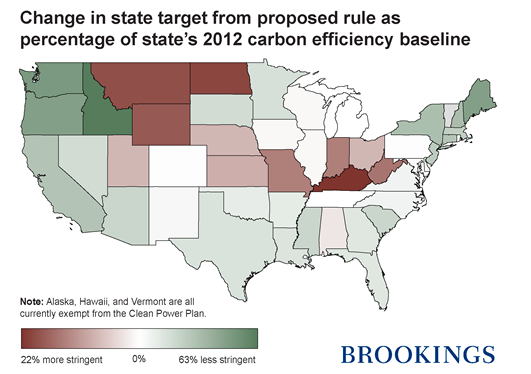The Obama Administration’s Clean Power Plan isn’t just rough on states that depend on coal and other fossil fuels for much of their energy needs; it’s much rougher than the administration originally proposed to make it.
The controversial new rule, which 16 states’ attorneys general have banded together to challenge in court, demands sharp reductions in carbon emissions from states that have not transitioned to cleaner forms of energy.
Related: Obama – The May Be ‘The Last Generation’ That Can Stop Climate Change
Brookings Institution fellow Philip A Wallach says that marks a sharp departure from an original proposal that “created fairness concerns that were destined to undermine the rule’s political foundation, as states overwhelmingly thought they were being treated unfairly.”
In the 1,560-page rule issues this week, the approach is very different. States like Kentucky and North Dakota, which rely heavily on coal, saw their required emissions reduction targets jump by as much as 22 percent. Other states that have implemented more clean energy policies saw their requirements get slashed – in Idaho’s case by nearly two-thirds.

“The new mix of targets is far easier to defend as equitable—which of necessity means it is much harsher on states that have done less to move toward carbon efficient energy production to date,” said Wallach.
Not everyone shares Wallach’s view, unsurprisingly.
Related: The High Cost of Climate Change – Wildfires Burn through the Forests Service Budget
The American Coalition for Clean Coal Electricity, a group supported by the coal industry, has been attacking the rule as an assault on consumers that could cost, it claims, up to $41 billion in increased electricity prices and would have “virtually no effect on climate change.”
“With the release of the final carbon regulation, the President once again demonstrated his lack of empathy for hard working Americans across the country who first and foremost wish to secure a robust economic future,” the ACCCE said in a release. “Instead of putting their priorities first, the President shamefully put his political legacy first.”
As of Thursday, 16 states had come together to ask the Environmental Protection Agency to stay enforcement of the rule until a lawsuit they plan to bring in challenge to the rule is settled. The states participating are Alabama, Arizona, Arkansas, Indiana, Kansas, Kentucky, Louisiana, Nebraska, Ohio, Oklahoma, South Carolina, South Dakota, Utah, West Virginia, Wisconsin and Wyoming. Others may join.
“This request is a necessary first step and prerequisite to confronting this illegal power grab. These regulations, if allowed to proceed, will do serious harm to West Virginia and the U.S. economy and that is why we are taking quick action to bring this process to a halt,” said West Virginia Attorney General Patrick Morrisey.




